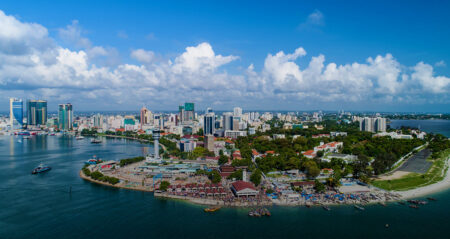In recent history virtually every continent and economic block has been trying to establish common trade area agreements as well as political unions. Africa is no different –SADC, ECA, COMESA, ECOWAS and SACU are just some of the examples of African countries trying to collaborate to drive the many aspects of social and economic development.
It is a system and an idea that promises to accelerate inclusion and promote regional prosperity among neighbours and the AfCFTA (The African Continental Free Trade Area) is rapidly becoming the embodiment of that reality – 28 African countries operating as a free trade area. As expected from an agreement of this magnitude, few people fully understand its complexity and intricacies.
FurtherAfrica spoke to one of AfCFTA’s strongest advocates. Mark-Anthony Johnson, CEO of JIC Holdings – an investment, trading and acquisition entity focused in Africa and emerging economies with roots back to 1985. Mark’s JIC operations are at the heart of what is poised to become the world’s largest free trade area.
Also Read: Interview – Adriano Maleiane, Mozambique’s Minister of Economy and Finance
Fabio Scala:
Mark, it’s always great to see you and very exciting to have the opportunity to discuss AfCFTA with you, so thank you very much for your time. Let me begin by asking you to give us a brief description of what AfCFTA is and its practical impacts in the participating economies.
Mark-Anthony Johnson:
Thank you, Fabio. Always happy to talk about Africa. But first, congratulations are due to you and FurtherAfrica on your excellent and informative platform. I am delighted to have the opportunity to shine the spotlight on AfCFTA with its huge potential to benefit the whole of Africa. I have every confidence that, as Africans begin to see the advantages of a free trade area, all the 55 countries of the African Union will eventually become fully fledged members of AfCFTA, creating a market of more than 1.3 billion people with a combined gross domestic product (GDP) of more than US$3.4 trillion.
AfCFTA will boost intra-African trade by eliminating import duties and will double this trade if non-tariff barriers are also reduced. Africans will experience greater freedom of movement, more jobs and wider access to goods and services, which will be more competitive because of opportunities for scale production, continental market access and better reallocation of resources.
As an example, it has been estimated that a 20% reduction in time in transit (time at border posts and on the road) will yield greater welfare gains than complete elimination of non-tariff barriers. In a nutshell, AfCFTA will create the conditions to generate more wealth, allow greater access to goods and services and improve living standards for the people of Africa. It will encourage a continental African mentality leading to greater co-operation and unity among the countries.

Fabio Scala:
That is quite an exciting and ambitious project. I often find myself explaining to foreign investors some “less publicised” practical trade deals already taking place in anticipation and as part of the AfCFTA essence. Any deals you would like to highlight?
Mark-Anthony Johnson:
JIC has been established in Africa for many years and already has interests throughout the continent in agriculture, fisheries, mining, infrastructure, telecommunication and real estate to name a few. We are now witnessing increasing interest from African and non-African businesses specifically wishing to invest in the 28 countries that are full members of AfCFTA.
For our part, we have initiated several projects in Africa that have then been expanded to include local and foreign partners. I can think of one such project where we have set up a pilot farm as a testing ground with a view to expanding this into potentially one of the largest farms in Africa leading to a series of mega-farms being rolled out across the continent.
This is an exciting time for new projects in Africa, but the farm is especially exciting and satisfying to me with its potential to supply Africa-grown food to Africans and at the same time create much-needed job opportunities. We expect to supply a mixed bag of produce, including rice, maize, vegetables and fruits. The beauty of this farm is that it has a fresh-water river running through the entire land.
Fabio Scala:
These are impressive prospects by any measure. I often feel that mainstream financial media could do a better job covering that. Anyway, one thing I often hear when I travel through Africa is – What are the practical impacts for the population? From cab drivers to bankers, many people ask me about the practical effects of the AfCFTA on daily life. What is your take on that?
 Mark-Anthony Johnson:
Mark-Anthony Johnson:
While AfCFTA will be good for business, I cannot stress enough the improvement that will be experienced at the consumer and social level. Because businesses will have greater opportunities, they will be able to grow, leading to more jobs, greater wealth creation and more tax revenue.
In turn, social infrastructure and education will improve. Consumers and businesses alike will not have to rely on foreign goods and the tide of imports will be reversed as local businesses become more competitive and turn to exporting “MADE IN AFRICA” goods produced by African companies collaborating on creating value-added goods for export.
Fabio Scala:
Sounds like we are looking at a potential game changer. I couldn’t let you go without asking you for your advice to foreign investors looking to invest in Africa. What is your message?
Mark-Anthony Johnson:
My advice is straightforward: this is the right time to invest in Africa.
Africa has long been a destination for foreign investment, but there has been a noticeable surge in interest from investors who are new to the continent in addition to the “usual suspects” and it is clear that this is setting a new trend.
What is novel, and this is gratifying to note, is that companies are looking at setting up new businesses in Africa that create goods for home consumption or for revenue earning exports.
Africa has a lot to offer and is where investors should be looking for their future activities.
I cannot finish without touching on the effects of COVID 19. The process of negotiations to finalise the details within the AfCFTA agreement have inevitably been slowed but are nevertheless continuing. The focus will be on ensuring that AfCFTA will be fit for purpose post COVID 19 and will look to bring on e-commerce negotiations in the context of the 21st century digital economy, a welcome and necessary development.












